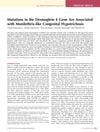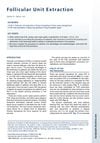 87 citations,
July 2018 in “Nursing Clinics of North America”
87 citations,
July 2018 in “Nursing Clinics of North America” PCOS is a common hormonal disorder in women, marked by symptoms like hair growth and menstrual issues, and requires personalized treatment.
 82 citations,
April 1981 in “Clinical endocrinology”
82 citations,
April 1981 in “Clinical endocrinology” A girl with rickets and hair loss was found to have a rare condition where her body didn't respond to vitamin D treatment.
 80 citations,
April 2018 in “Trends in Molecular Medicine”
80 citations,
April 2018 in “Trends in Molecular Medicine” Lichen Planopilaris and Frontal Fibrosing Alopecia may help us understand hair follicle stem cell disorders and suggest new treatments.
78 citations,
November 2005 in “Endocrinology” Hairless protein can block vitamin D activation in skin cells.
 74 citations,
June 2010 in “European Journal of Pharmaceutics and Biopharmaceutics”
74 citations,
June 2010 in “European Journal of Pharmaceutics and Biopharmaceutics” Minoxidil foam enters hair follicles and skin for hair growth.
 74 citations,
August 2006 in “Journal of clinical gastroenterology”
74 citations,
August 2006 in “Journal of clinical gastroenterology” Shen-Min, a hair growth supplement, likely caused acute hepatitis in a woman, improving after she stopped taking it.
 74 citations,
January 2006 in “The journal of investigative dermatology/Journal of investigative dermatology”
74 citations,
January 2006 in “The journal of investigative dermatology/Journal of investigative dermatology” Mutations in the DSG4 gene can cause a rare hair disorder similar to monilethrix.
 74 citations,
July 1979 in “Lancet”
74 citations,
July 1979 in “Lancet” Biotin treatment can significantly improve hair loss and motor functions in certain metabolic disorders.
 70 citations,
August 1995 in “Fertility and Sterility”
70 citations,
August 1995 in “Fertility and Sterility” Finasteride reduces hairiness and androgen levels in women with unexplained excessive hair growth.
 67 citations,
February 2010 in “Acta Obstetricia et Gynecologica Scandinavica”
67 citations,
February 2010 in “Acta Obstetricia et Gynecologica Scandinavica” Hirsutism is a strong sign of high male hormones and metabolic problems in women with PCOS, but acne and hair loss are not.
 67 citations,
March 1987 in “Journal of The American Academy of Dermatology”
67 citations,
March 1987 in “Journal of The American Academy of Dermatology” Minoxidil helps hair growth and prevents hair loss in androgenetic alopecia. It's safe and effective.
 58 citations,
January 2006 in “Skin Pharmacology and Physiology”
58 citations,
January 2006 in “Skin Pharmacology and Physiology” High levels of testosterone and 5α-DHT can lead to cell death in cells important for hair growth.
 58 citations,
October 1993 in “International Journal of Dermatology”
58 citations,
October 1993 in “International Journal of Dermatology” Minoxidil helps hair growth and reduces shedding in women.
 55 citations,
November 2004 in “Expert opinion on drug safety”
55 citations,
November 2004 in “Expert opinion on drug safety” Chemotherapy often causes hair loss, nail changes, and mouth issues, but these are usually manageable.
 51 citations,
October 2002 in “British Journal of Dermatology”
51 citations,
October 2002 in “British Journal of Dermatology” Finasteride increases hair density in female androgenetic alopecia, but individual results may vary.
 51 citations,
March 1987 in “Journal of The American Academy of Dermatology”
51 citations,
March 1987 in “Journal of The American Academy of Dermatology” Minoxidil keeps most hair growth from first year and twice-daily use is better with few side effects.
 51 citations,
October 1980 in “The New England Journal of Medicine”
51 citations,
October 1980 in “The New England Journal of Medicine” Minoxidil lowers blood pressure effectively but may cause unwanted hair growth and other side effects.
 50 citations,
November 2010 in “Plastic and Reconstructive Surgery”
50 citations,
November 2010 in “Plastic and Reconstructive Surgery” Botox increased hair count in men with baldness and might work by improving scalp blood flow.
 45 citations,
January 2020 in “Pharmaceutical Biology”
45 citations,
January 2020 in “Pharmaceutical Biology” Dendrobium officinale polysaccharides may help with hair growth, skin moisturization, and protection against oxidative damage.
 45 citations,
November 1979 in “British Journal of Dermatology”
45 citations,
November 1979 in “British Journal of Dermatology” Minoxidil causes excessive hair growth in almost all patients.
 44 citations,
April 2012 in “American Journal of Clinical Dermatology”
44 citations,
April 2012 in “American Journal of Clinical Dermatology” Scarring alopecias are complex hair loss disorders that require early treatment to prevent permanent hair loss.
 44 citations,
November 1998 in “Australasian Journal of Dermatology”
44 citations,
November 1998 in “Australasian Journal of Dermatology” Accurate diagnosis is key for treating different kinds of hair loss, and immune response variations may affect the condition and treatment results.
 44 citations,
March 1987 in “Journal of The American Academy of Dermatology”
44 citations,
March 1987 in “Journal of The American Academy of Dermatology” Using minoxidil on balding scalps can stimulate hair regrowth and increase blood flow. It's an effective treatment for early hair loss.
 43 citations,
November 1992 in “International Journal of Dermatology”
43 citations,
November 1992 in “International Journal of Dermatology” Minoxidil 2% effectively treats female hair loss, promoting growth and density.
 41 citations,
August 2013 in “Facial Plastic Surgery Clinics of North America”
41 citations,
August 2013 in “Facial Plastic Surgery Clinics of North America” FUE provides minimal scarring and quick recovery in hair transplantation, and surgeons not using it may lag in technology.
 41 citations,
February 1970 in “Archives of Dermatology”
41 citations,
February 1970 in “Archives of Dermatology” Oral contraceptives can cause skin issues like dark patches, acne, yeast infections, sensitivity to light, spider veins, skin rashes, and hair loss.
 40 citations,
January 2003 in “Gynecological Endocrinology”
40 citations,
January 2003 in “Gynecological Endocrinology” Finasteride effectively reduces hair growth in women with polycystic ovary syndrome or idiopathic hirsutism.
 38 citations,
February 2012 in “Supportive Care in Cancer”
38 citations,
February 2012 in “Supportive Care in Cancer” Skin problems like acne, dry skin, and nail and hair changes are common in patients taking EGFR inhibitors.
 37 citations,
December 2007 in “International journal of clinical practice”
37 citations,
December 2007 in “International journal of clinical practice” Hirsutism is excessive male-pattern hair growth in women, often caused by hormonal imbalances, and requires ongoing treatment to manage.
 35 citations,
November 2020 in “Dermatologic Therapy”
35 citations,
November 2020 in “Dermatologic Therapy” Severe COVID-19 may cause hair loss, and doctors recommend supplements and topical treatments to manage it.





























